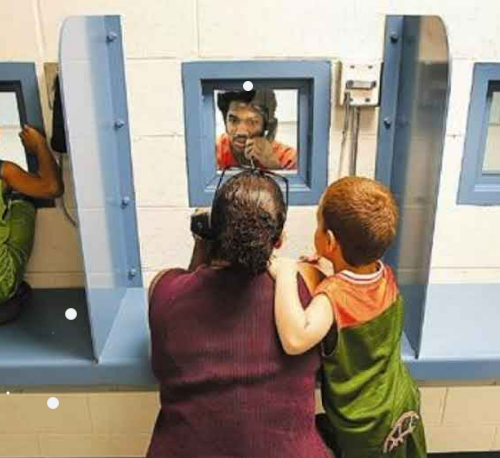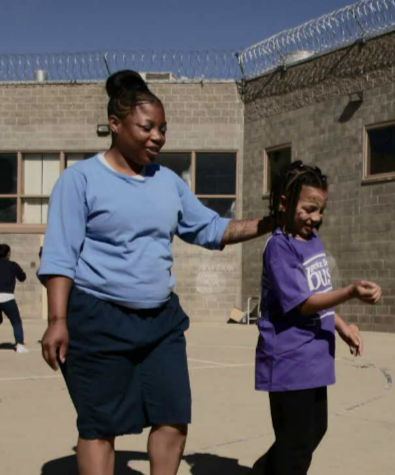By: Reya Kandaswamy and Coco Maynard

Visitation and other communication methods are scarce for many families and can greatly impact the mental well-being of the incarcerated person and their family.
Social justice is an everlasting issue that confounds and upsets many. While there are many different facets and topics within the broader issue of social justice, the largest of them is the people affected by the wrong-doing of our courts. This does not only apply to individuals wrongly convicted, but it applies to the families of any and everyone convicted. 1 in 24 children in the United States has a parent that is incarcerated, and the impact of that burden is immeasurable, but by exploring potential risks backed by data, we aim to learn as much as we can in order to eventually lower this rate of incarceration.
With the United States carrying the title of the highest incarceration rate globally, there are more than five million children with parents incarcerated. These children are considered an incredibly vulnerable group, for many different reasons. Incarceration has an indelible impact on people of all ages, but because children are so impressionable, introducing them into a world of law and crime can be incredibly damaging, especially when 60 – 70% of every person incarcerated is considered legally innocent. These children are being taught not to trust the system and not to have faith in those around them. 47% of incarcerated individuals are parents to children under 18, with the number of incarcerated people mirroring the amount of impacted children. Challenges are also likely to particularly affect mothers (58%) compared to fathers (43%). The impact of incarceration on families is almost immeasurable, but thanks to decades of self-reported data from prisoners, we are able to understand some of said impact.
Some other challenges that families involved in the prison system face include emotional distress, parenting dynamics, and legal burdens, impacting both children and adults. In general, it is very hard for families to stay connected through incarceration, with little help from federal and state systems. Around two thirds of incarcerated parents have never received a visit from their children, which tends to take a toll on both sides. Much of this is due to physical distance, lack of visitation assistance like providing transportation, or the system completely taking away visitation. There are many local and federal organizations and support groups that work to combat these issues such as VOTE. and Daughters Beyond Incarceration in Louisiana, as well as Prison Fellowship, Prison Families Alliance (PFA), and many more throughout the country.

Children of the incarcerated require financial and emotional support
While these groups have assisted families in a number of diverse ways–such as VOTE increasing access to communication by decreasing phone call prices–there are still outlying problems involving social stigma and financial instability that require more attention. Many parents who are left as sole caretakers of their children due to their partner’s incarceration are the main subject of these burdens. They are often left to cover family costs on a sole income, as well as payments involved in their partner’s parole and other legal fees. Additionally, many of these people lack access to support systems, which can greatly affect the mental health of all involved parties. As this pattern mainly targets financially unstable families of color, addressing these systemic challenges is crucial to ensuring equitable support and improving outcomes for all affected individuals.
Overall, the issues created by our prison and justice systems are immense and multifaceted. We tend to think about the individuals facing the extreme consequences such as incarceration, but overlook who is affected by this incarcerated. Families often lose contact, income, hope, and much more. By continuing to educate and try to understand some of the struggles in the prison system, we aim to improve it over time.
This piece is part of an on-going series from professor Betsy Weiss’s class, “Punishment and Redemption in the Prison Industrial Complex,” which is taught at Tulane University in the Young Public Scholars Pre-College Program.
 NOLAbeings
Multimedia artist Claire Bangser created NOLAbeings as a portrait-based story project that marries...
NOLAbeings
Multimedia artist Claire Bangser created NOLAbeings as a portrait-based story project that marries...
 Data corner: Adobe Suite (create a PDF, social media graphic, presentation, edit a photo and video
Data corner is where you go to work with analytics and top tech skills. It takes on everything from PERL and SQL to Canva and Sprout Social.
Data corner: Adobe Suite (create a PDF, social media graphic, presentation, edit a photo and video
Data corner is where you go to work with analytics and top tech skills. It takes on everything from PERL and SQL to Canva and Sprout Social.
